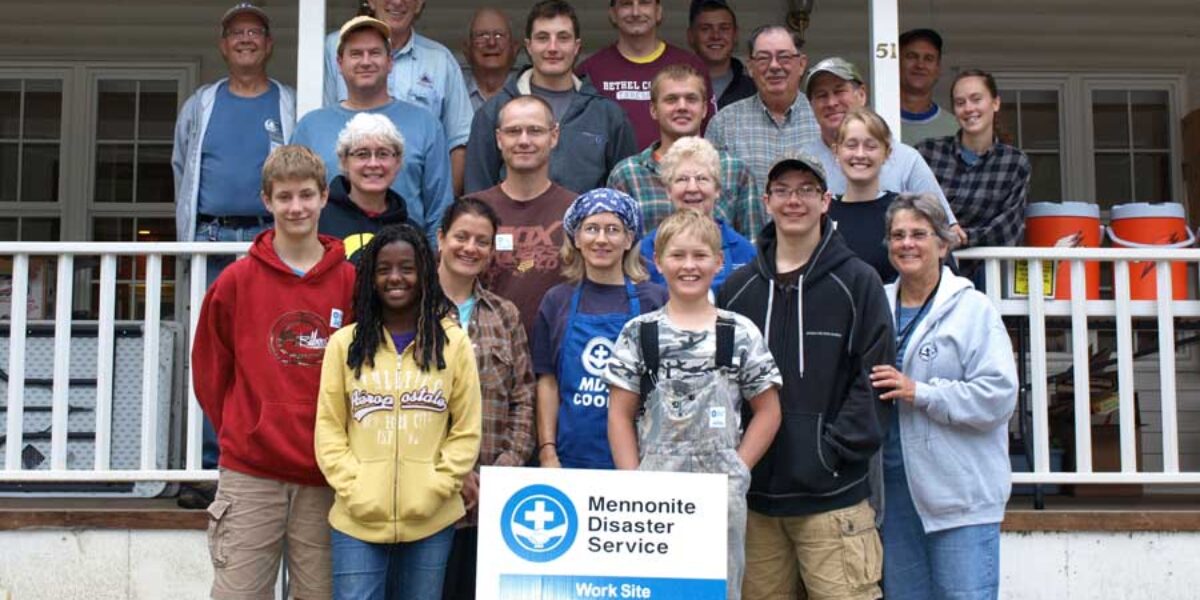"Don’t lock your van doors. The bears have figured out how to open vehicle doors, and they will do more damage to your van if they try to get in while the doors are locked,” said Clete Yoder, a Mennonite Disaster Service volunteer. This was our introduction to our work week with Mennonite Disaster Service (MDS) at Jamestown, Colorado. It was unsettling to realize that he was not joking.
Jamestown experienced unprecedented flooding the night of Sept. 11, 2013, when the area received the equivalent of their annual rainfall in a period of days. This turned a small creek into a raging river that rerouted itself through the town. Half of the roads were destroyed, both bridges washed out, and, as a result, 90 percent of the town of 300 had to relocate. They also lost a longtime resident to a mudslide.
MDS set up a unit in June 2014 to provide lodging and meals for volunteers helping with the long-term recovery.

This house in Jamestown was across the street from where the volunteer’s stayed. The destruction here is typical in the town where the flood tore apart homes. This home is on schedule for demolition. Photo by Dwight Mueller.
Our week at the end of July, 24 people volunteered. This included our group of seven (ages 21-80) from First Mennonite Church of Halstead, Kansas; a family from Pulaski, Iowa; and a family from Kleefeld, Manitoba; plus long-term leaders. We painted, put up Sheetrock, laid flooring, landscaped, did demolition, and replaced interior trim.
We had a great week making new friends, and we learned a few things along the way.
-
Be patient with the circumstances. The early inconvenience of cramped sleeping quarters, 6 a.m. alarms, walking 100 yards to the shower trailer, using porta-potties, and delays in work projects seemed to fade as the week went on and we got into a routine.
-
It is important to listen. On one project we worked on Dave and Emma’s* home where the flood filled their six-foot crawl space with dirt, ruining their floors. We spent a few days repairing the floors, and took many opportunities to stop and ask questions, and listen to their stories about what they have gone through over the last year. A close relationship was formed. On the last day, Dave brought us donuts (which he carried on the back of his motorcycle for the 30-minute ride from Boulder) and showed us pictures and videos of the flooding.
He described the night of the flood, how he rescued people by taking them across the flooded creek to high ground. The waters kept rising and on his last trip, water was coming over the hood of his truck.
We realized that talking about those events was a part of the healing process for Dave as he said that he had not talked about or looked at those pictures for many months. He also said that we provided them with renewed energy to complete the long task of making their home livable again. We found out later that Dave had had some “cold” feelings and a lack of trust with groups working on their place. In part, by listening, feelings were reconciled and a change of heart took place.
-
The community was watching. People in the community noticed what we said, how we worked, how we treated each other and the locals. Religion is not big in Jamestown and their view of Christians was in part formed by seeing the volunteer groups work. We were reminded that we represented our families, home communities, Mennonites, and Christians in general by our actions, as we played a small part in their long road to rebuild their community and restore hope.
It was inspiring to feel and see God in the beauty of the Rocky Mountains, in the perseverance of the grateful people of Jamestown, and in the development of a close bond with the other MDS volunteers, coming together to serve with a common goal.
I would encourage anyone to take part in multigenerational service trips when possible. It was not easy, but it was a fun, meaningful, and inspiring week! By the way, we did leave our van unlocked and although someone spotted a mountain lion and numerous foxes, we saw no bears!
*Full names withheld for privacy.








